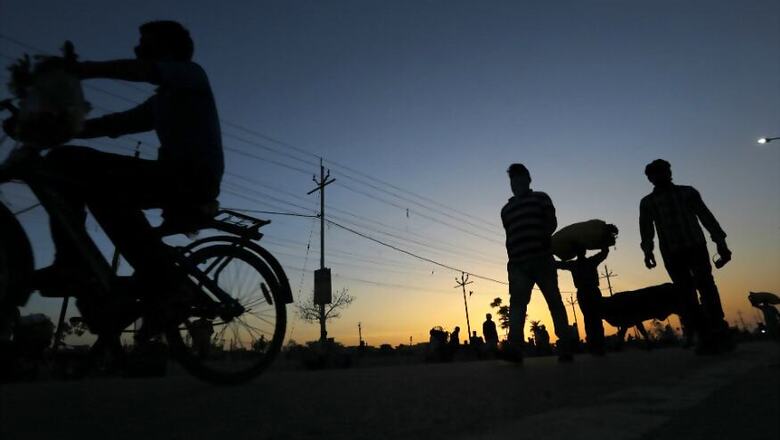
views
In the past few weeks, many of us have made plans for doing certain activities when 'things get normal'. Unfortunately, we all know that things might never return to the version of normal we left behind in 2019, in a pre-coronavirus world.
Scientists and experts believe that this global health crisis will shape the world in a way that will not only change governmental policies and economic frameworks, but also impact the very fabric of our societies and lives, and structure our personal habits for years to come.
There are many possible futures that we are staring at currently, and there is no crystal ball to see which one would lead us where. Another uncertainty that we are looking at is the economic fallout in the aftermath of the global health crisis.
How the future unfolds will depend on governments' responsiveness to the health crisis and individuals' sense of responsibility. However, experts, scientists and philosophers provide a very gloomy image of the coming days.
Here's a look at how our work habits, education system, jobs, socialising manners are likely to change in a post-pandemic world.
Will More People Work From Home?
Before we nosedive into the gloomy projections about job losses, let's spend a minute appreciating the fact that nowadays we don't have to waste precious hours commuting to work. After the coronavirus outbreak, several companies have asked their employees to work from home, and while majority of them are using up their extra 'free' time snacking up, or binge-watching shows, this period might actually revive corporates' faith in the effectiveness of 'work from home' policy for their millennial staffers, many of whom prefer to work remotely, even if that means taking a slight pay cut.
So far, corporates had been wary about the 'work from home' policy. According to a study done by the Harvard Business School and Boston Consulting Group, most companies do not prefer their staff to work remotely. However, if this pandemic changes that, it may be beneficial for both -- the employers and the environment.
If staff work from home, then companies don't have to spend on large overpriced office spaces and will have access to a much larger talent pool as they can hire from anywhere in the world, with location no longer being an issue. It will also reduce pollution considerably as work-from-home employees will not step out of the house to commute to work.
However, in the United States, a very bizarre situation has unfolded with many employers, acting like Big Brothers, installing tracking devices into the office laptop given to staff for work-from-home. Needless to say, these controlling instincts of managers are exceptionally intrusive. According to a Vox report, Zoom, the video conferencing platform that is being used a lot these days, has a feature called the 'Attention Tracker' that allows the employers to observe if any staff member switches to another app for more than 30 seconds.
There are several other tracking methods, some of which are too subtle for people to realise easily. However, the most common ones are tracking software which tell the employers how long an employee uses social media and another one which records screenshots of the staff member’s home screen at regular intervals.
While the 'work-from-home' policy has many advantages, this practice needs to be built on mutual trust. If employers keep thinking that staffers would slack without constant supervision, and staffers, on the other hand, find reasons to slack, then it might not work in the post-pandemic future. Also, putting a digital leash on staffers may not increase their productivity but can actually cause many to burn-out, and reduce the work capacity in the long run.
Furthermore, for some occupations, work-from-home option cannot be made available, like banking, manufacturing, construction etc, and these workers will always have to step out to work.
136 Million Jobs in India at Immediate Risk
Many big and small businesses, enterprises, and services are already struggling to pay salaries to their employees during this lockdown. However, the situation is projected to be far worse in future.
According to a report cited in The Mint, data collected by the National Sample Survey (NSS) with Periodic Labour Force Surveys (PLFS) indicates that 136 million jobs are at risk, immediately. These jobs are mostly non-agricultural and will impact people with no formal written contracts, self-employed entrepreneurs, small companies and businesses. Although the daily wage labourers are currently out of work, once the lockdown is withdrawn, the situation might alleviate a little for them.
But, the same cannot be said about individuals who have short-term contracts with their companies. They will be jobless once we enter the post-pandemic phase.
The automobile industry had already seen job cuts due to dwindling sales. Post-coronavirus, such cuts may also happen in the manufacturing sector like food products, textiles etc according to the predictions made by a staffing company, Adecco Group India.
Although this data depicts a bleak future, let's not be pessimistic, not lose hope just yet. In 2003, when SARS (Severe acute respiratory syndrome) had hit Asian countries, according to The Guardian, it had “knocked at least $16.5 billion off the GDP in nine Asian economies”.
However, these economies saw a rebound the next year due to pent-up demand by consumers. Whether it will happen this time around is hard to say, but if it does, chances of job losses can be brought down considerably.
The Way We Travel
If the COVID-19 crisis continues well into 2021, then the Confederation of Indian Industry (CII) predicts that tourism and hospitality industry will suffer losses of at least 20 million jobs. However, it isn't just the job loss that is worrisome, the way human beings travel, even the Instagram loving millennials, is likely to see some drastic changes.
The 'stay at home' medicine to avoid coronavirus during these times, may result in changing people's willingness to travel. Many may also find current travel bans a deterring factor. An article published in Outlook Traveller gives an insight into what the future of travel might be in the coming years, where Ashish Kumar, Co-Chairman of FCCI Travel and Technology Committee, propounds that elderly people, who are the most vulnerable group susceptible to the virus, may not prefer travelling as much as they used to previously. Also, health safety will be a determining factor for travellers, which will make some locations 'safer' than the others.
Corporate travel may also take a hit, given that most of the work is now being done by video-conferencing, companies may be unwilling to pick up the tab and fly out individuals for meetings, and do everything online instead.
The visa rules of several countries may also be changed and restrictions can be imposed, like in the case of yellow fever, to ensure health safety of citizens, pointed out Kumar.
Group travels, which was very popular until now, especially among older clientele may need re-evaluation and perhaps has to be customised to cater to individual needs, as people may still not be very open to travel in groups. Apart from that, several airlines might incur heavy losses due to lockdown and travel ban in several countries.
How they would cope with this lull period will define the robustness of the aviation industry in future. Hospitality sector may also have to balance their bank accounts, as the entire spring, and beginning of summer, which are busy travel months, have barely shown them any business.
Inherent Inequality in Access to Education
As adults work from home, young children are being schooled online. At least some of them are anyway. There are many Indian schools that have started online teaching in a hurry to finish the curriculum on time. Due to this, not only are children learning to navigate technology usefully, rather than just using it only for social media, but are also taking charge of their education and not just passively learning online. They are participating actively, interacting with teachers and fellow classmates online. But will online learning be a sustainable model for future use? It will depend on various factors especially in a country like India.
Access to education, through access to technology, has brought forth many inherent socio-economic divides that educators can choose to overlook in a real classroom. The presupposition that everyone in a school will have access to the same internet bandwidth and will have personal computers to participate in online classes is misplaced. Privileged kids have the agency and access to learn through this new medium, they have tutors to guide them to better use technology, but many kids, even those who go to reputed private English medium schools, may not have those privileges at home.
Furthermore, Indian kids at the grassroots level have no access to such technology, and are, therefore, learning little during this crisis, which may last for as long as the next year, according to some reports.
So, for technology to be a medium of imparting knowledge in a post-coronavirus world, it has to be made accessible to all, and educators have to be better equipped to teach online. However, at this point, it doesn't have the potential to be the primary medium of educating children, because of the obvious lack of availability and the fact that various schools provide children from low-income households food and support, which they will miss out on if they were to learn from home.
Personal Data
Governments of various countries are using technology to keep tabs on coronavirus patients. According to an article written by Yuval Noah Harari in Financial Times, countries like china are using surveillance tools to do so.
In the FT article, Harari wrote, "By closely monitoring people’s smartphones, making use of hundreds of millions of face-recognising cameras, and obliging people to check and report their body temperature and medical condition, the Chinese authorities can not only quickly identify suspected coronavirus carriers, but also track their movements and identify anyone they came into contact with. A range of mobile apps warn citizens about their proximity to infected patients."
Harari also added that Israeli Prime Minister Benjamin Netanyahu followed in China's footsteps and deployed tech used to combat terrorism to identify coronavirus patients. These actions although effective, Harari pointed out, not only normalise mass surveillance equipment but also “mark a watershed moment in surveillance history”, as it takes surveillance from 'over the skin' (like phones, emails) to 'under the skin' (like body temperature, blood pressure).
Another reason, for which Harari said this kind of surveillance is problematic is because no one really knows for sure what the government is surveilling. Also, once a surveillance rule come into place, it tends to linger even after the reason for its introduction -- in this case Covid-19 -- is long gone.
Would you want to be living in a world where your most personal data -- the data of your bodily functions -- is being constantly reported to the government? It may still be a matter of choice for us in India, it isn't one in China.
No Hugs or Handshakes
The longer the healthcare crisis lasts, the longer we continue to practise social distancing, the more permanently the habits which we grow now will stay with us. Experts believe that we are likely to wash our hands often and continue with good hygiene practices in future. We might also withhold on all the free friendly hugs we gave to our loved ones, and the culture of shaking hands may slowly die out. Human interactions always crave contact, intimacy, but post-pandemic, many might be wary to reach out for such closeness too quickly.
Social dinners and soirees where people, sometimes even strangers, come together to share a lavish meal, and conversations, had been a growing trend among millennials, but that might soon vanish, or at least see a steady decline.
As more people avoided outside food during the lockdown period, they might wean off their habit of ordering take-outs and cook at home more often. Those who will continue to order take-outs will want to make sure they are cooked in a hygienic way, above all things.
Chances are people will continue to avoid big social gatherings and large crowds for some time to come, so virtual meet-ups like online tea parties, and birthday celebrations and virtual events like concerts, will continue to remain popular in the post-pandemic phase.
Social Stigma of Being a Coronavirus Patient
Unfortunately, dealing with Covid-19 doesn't end with treating the disease but also the stigma that is being associated with it. If vaccines of this infectious disease are not made available soon, and if it continues to afflict many more, cases of discrimination, xenophobia and stigmatising patients are likely to rise, once the lockdowns are withdrawn and life goes back to some version of normal.
The government of various countries will have to take quick steps to nip such regressive attitude in the bud.
Across the world, we have heard stories of discrimination ever since coronavirus surfaced. Asians, especially Chinese nationals, have been targetted, and racism has been rampant.
In India, landlords of doctors and nurses have evicted them fearing that they might bring the virus home. Pilots and air hostesses have also been targetted for flying in Indians from coronavirus-affected countries.
The first step should be to educate citizens about the virus, its mode of transmission, its incubation period if we want coronavirus patients to survive the disease without facing discrimination or any kind of abuse. People have to understand the disease better.
Advertisements with generic information like wash your hands, and practise social distancing are good efforts, but an integrated information campaign is exceptionally important at this point to fight the stigma against the disease. Strong punishments should also be framed by the law for anyone or any group which tries to stigmatise a patient.
Closer home, HIV patients have fought a long horrifying battle against social discrimination for contracting the disease. If the same happens with coronavirus patients after so many years, it will not only be unjust but also reflect poorly on how little we have evolved as a society. So it is very important to change the narrative and give coronavirus patients the love and support they deserve for fighting a deadly virus.




















Comments
0 comment